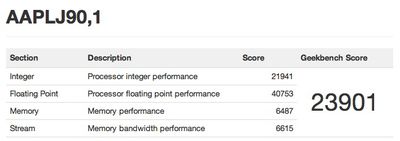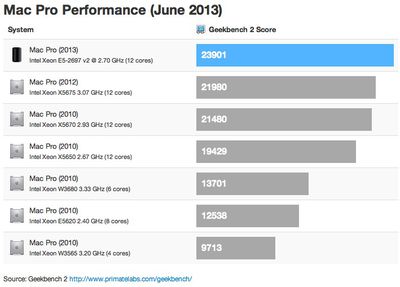While Apple offered a sneak peek at its dramatically redesigned Mac Pro at its Worldwide Developers Conference, the new machine is not scheduled to launch until "later this year" and the company has yet to reveal detailed specs and pricing information.
But if a new Geekbench result is authentic, it appears that the new machine is already starting to show up in public benchmarking databases. Rather than showing up as a "MacPro6,1" as would be expected for Apple's next-generation Mac Pro, the new machine is dubbed "AAPLJ90,1", perhaps a reference to a J90 code name following Apple's usual format.

Also supporting the authenticity of the entry is the listing of a custom build of OS X Mavericks, 13A2054, running on the machine. The listed motherboard ID is also one which was discovered in OS X Mavericks as corresponding to the new Mac Pro.
The machine in question is running a single 12-core processor from the upcoming Ivy Bridge-E family, specifically the Xeon E5-2697 v2 running at 2.7 GHz. It is also equipped with 64 GB of RAM.
A comparison of this new Mac Pro entry with Apple's current high-end 12-core Mac Pro running a pair of 3.06 GHz Westmere processors reveals improved performance on Geekbench benchmarks by most measures, ranging from slight improvements for certain tasks to substantial improvements for others.

We chatted with John Poole of Primate Labs, who highlighted the substantial improvements in many single-core measures and in memory performance, suggesting that lower multi-core scores later in the Integer Performance testing run could be indicative of thermal issues.
Poole notes that with a public launch of the new Mac Pro likely still many months away, it is entirely possible that Apple is still ironing out both software and hardware issues on the new Mac Pro and that the company's work could lead to even more substantial performance gains once those issues are addressed.
Update: Poole has now shared some of his thoughts on the Mac Pro result in a blog post.
...Apple's claim of "up to 2x faster" floating point performance may be optimistic. The new "Ivy Bridge" Xeon processor in the new Mac Pro has instructions that can process twice the amount of data as the "Westmere" Xeon processors in the current Mac Pro. The problem is that only certain kinds of software can take advantage of these instructions.




















